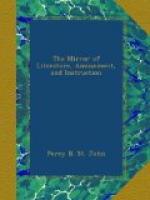The song they demanded in vain—it
lay still
In our souls as the wind that hath died
on the hill;
They call’d for the harp—but
our blood they shall spill
Ere our right hand shall teach them one
tone of their skill.
All stringlessly hung on the willow’s
sad tree,
As dead as her dead leaf those mute harps
must be.
Our hands may be fettered—our
tears still are free,
For our God and our glory—and
Sion!—Oh thee.
THEY SAY THAT HOPE IS HAPPINESS.
“Felix qui potuit ferum cognoscere causas.”—Virgil.
They say that Hope is happiness;
But genuine Love must prize
the past,
And mem’ry wakes the thoughts that
bless:
They rose the first—they
set the last;
And all that mem’ry loves the most
Was once our only hope to
be,
And all that Hope ador’d and lost
Hath melted into memory.
Alas! it is delusion all:
The future cheats us from
afar,
Nor can we be what we recall
Nor dare we think on what
we are.
The foregoing lines were officiously taken up by a person who arrogated to himself some self-importance in criticism, and who made an observation upon their demerits, on which his lordship quaintly observed, “they were written in haste and they shall perish in the same manner,” and immediately consigned them to the flames; as my music adapted to them, however, did not share the same fate, and having a contrary opinion of any thing that might fall from the pen of Lord Byron, I treasured them up, and on a subsequent interview with his lordship I accused him of having committed suicide in making so valuable a burnt offering: to which his lordship smilingly replied, “the act seems to inflame you: come, Nathan, since you are displeased with the sacrifice, I give them to you as a peace offering, use them as you may deem proper.”
When the Hebrew Melodies were first published, Sir Walter, then Mr. Scott, honoured me with a visit at my late residence in Poland Street: I sang several of the melodies to him—he repeated his visit, and requested I would allow him to introduce his lady and his daughter; they came together, when I had the pleasure of singing to them Jephtha’s Daughter and one or two more of the most favourite airs; they entered into the spirit of the music with all the true taste and feeling so peculiar to the Scotch.
Mr. Scott again called on me to take leave before his return to Scotland; we entered into conversation respecting the sublimity and beauty of Lord Byron’s poetry, and he spoke of his lordship with admiration, exclaiming “He is a man of wonderful genius—he is a great man.”




